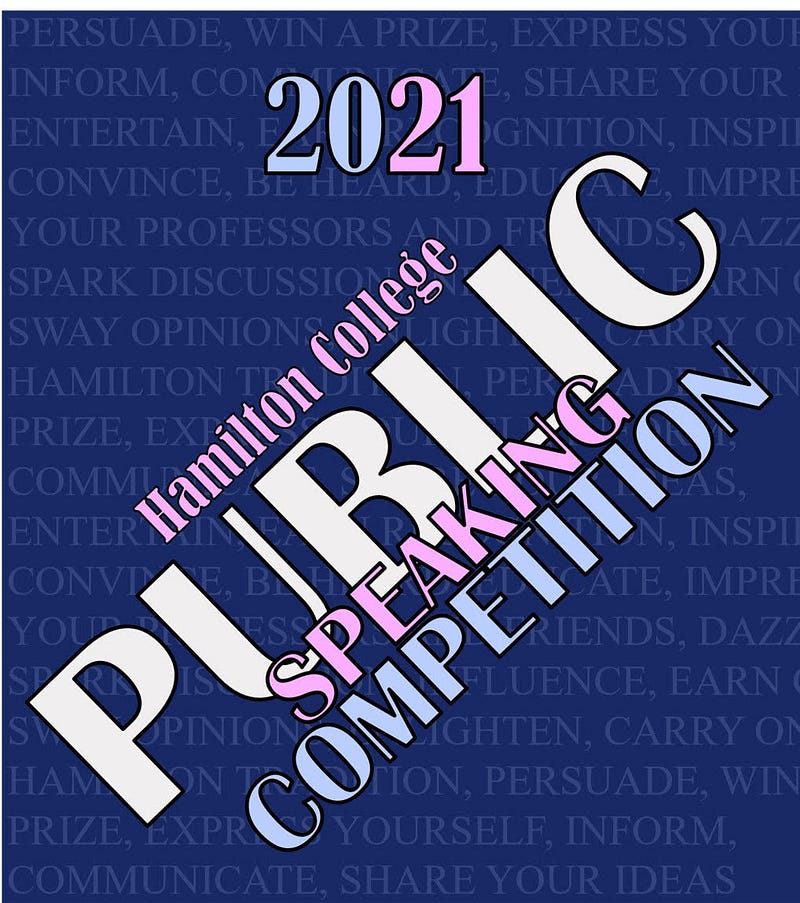
Over the past few weeks, Hamilton students competed in the annual Public Speaking Competition. The preliminary round began on March 1 and the final round lasted between March 22–24. 12 finalists compete in three competitions, six winners, and over $15,000 in prize money during the final round. All participants presented their speeches over Zoom, which brought new challenges to the historic Hamilton tradition.
Participants competed for three separate prizes. The McKinney Prize was open to students of all classes and required students to give a persuasive speech on a topic of interest to the Hamilton community. The Clark Prize was open to seniors, and all speeches were required to answer the assigned question: “Is social media a waste of time?” The final competition was the Warren E. Wright Prize, which was limited to students who took public speaking courses. According to the description, this prize required participants to deliver an informative speech that must “enlighten rather than to advocate.”
Hamilton College has long prided itself on its commitment to public speaking. “For much of the College’s history, students were required to give presentations regularly. The first curriculum of the College required students to speak in front of their classmates and faculty in the Chapel regularly,” said Director of the Oral Communications Center Amy Gaffney.
The preliminary round involved students presenting their speeches without judges present, while the final round was open to public viewing. When planning the tournament, Gaffney emphasized the importance of having “a structure that allowed for everyone, even remote students, to compete on a level playing field.” Additionally, to combat “Zoom fatigue,” Gaffney elected to “break up the final round into three nights rather than one afternoon.”
The virtual format created new opportunities for the competition. In keeping with tradition, judges consisted of faculty, professors, and alumni. However, Gaffney found that “this year’s virtual format actually opened more possibilities” and permitted alumni “who normally couldn’t travel to campus to serve as judges” to be included in the event.
The virtual format also challenged participants in unique ways. “The biggest challenge of the new COVID-friendly, virtual format… was not being able to give my speech to an in-person audience,” said Jonina Mignon ’21, who competed for the McKinney Prize. “I missed the element of engagement and interaction with the audience because for me personally, being able to see who I’m speaking to and play off of people’s reactions always helps calm my nerves.”
In contrast, McKinney Prize winner Eric Moss ’24 liked that the virtual format “provided us with a more accessible platform from which we could share our ideas. I’m grateful to have been a part of an experience where students’ voices were heard and where our messages could still resonate, even if from afar.”
The winners were announced in a pre-recorded video released on Saturday, March 27. The winners of the McKinney Prize were Eric Moss ’24 for his speech “The .1%”, Abbie Wolff ’22 won for her speech “”Mark Zuckerberg Wants You to Keep Scrolling: The Real Value of Your Screen Time”, and Aurora Cai ’21 won for her speech “Do Not Let Your Uniqueness Mute You”. Additionally, Lily Delle-Levine ’21 won the Clark Prize for her speech “Time for Change: Social Media as Social Action”, and Jay Menner ’21 was awarded the Warren E. Wright Prize for her speech “Who Was Alexander Hamilton?”.
















